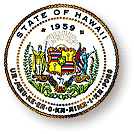State nets overdue $260M
Delinquent taxes, most from Hawaii businesses, flow in more efficiently with a new computer
By Mark Niesse
Associated Press
Hawaii's tax collectors are catching up with people who have not been paying their taxes, resulting in a record $260 million tracked down last year.
 The delinquent collections go straight into the state's general fund.
The delinquent collections go straight into the state's general fund.
While the construction boom, high tourism numbers and windfall excise tax collections from high gas prices are widely credited for a projected $574 million state surplus, rising delinquent tax collections are also a major contributor.
If none of the hundreds of millions of dollars in overdue state taxes had been collected last year, the surplus could be about half of what it is.
Tax officials have counted more than $300 million in still-delinquent taxes but expect there are hundreds of millions of dollars more on unreported cash transactions, underreported income and other evasions or delays in paying revenue owed to the state.
A jazzed-up computer system has helped tax collectors find these businesses and citizens that are years behind in payments, said Kurt Kawafuchi, state taxation director.
Delinquent tax payments have increased every year since 2000, with the biggest increase coming last year, when collections jumped 66 percent from $156 million in 2004.
"We want to do our best to make sure people are paying their fair share," Kawafuchi said.
Most of this new money came from businesses that had not been paying the state's general excise tax, which is 4 percent on goods and services. Eighty-seven percent of the delinquent collections came from businesses, and only 13 percent was from individuals.
That is by design, Kawafuchi said. Tax collectors and auditors were directed to go after big-money tax evaders because they bring the largest windfall to state coffers.
Another boost came from two settlements with single corporate taxpayers amounting to $36 million.
The state's new $53 million computer system has done a lot of the heavy lifting in tracking down tax money that is owed to the state. The computers consolidate tax information, detecting people who once paid taxes but stopped, and automate the billing process, Kawafuchi said.
The computer sends out bills nearly every day of the week, compared with only once or twice a week when invoices were calculated by hand, said Wayne Kinoshita, collections technical coordinator for the tax department.
"We are looking at the taxpayers who intended to be good taxpayers, but they have fallen to the wayside," Kinoshita said.
The tax office has been surveying compliance levels among different industries to evaluate what kinds of businesses are more likely to have not paid their taxes, Kawafuchi said. Tax collectors are now looking at the vacation rental, bed-and-breakfast, construction and services importation industries.
"There's still a lot more we could do, and we could do even better," said Titin Liem, a special assistant in the tax department.
When people and businesses have not been paying their taxes, it is not always because they were trying to skirt the law, Kawafuchi said.
"Sometimes they're just not familiar with Hawaii law. Other times, they don't think they owe it," he said. "Anyone doing business in Hawaii, legally they should be paying the taxes."
Tax officials say they now plan to target taxpayers who have never filed, especially people who hold business licenses.
"We're just scratching the surface," Kawafuchi said. "My advice would always be to do the right thing and come clean and file your taxes."

